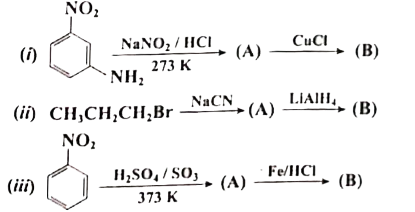Complete Solutions to ADDITIONAL QUESTIONS ( 3- MARK QUESTIONS) of chapter ORGANIC NITROGEN COMPOUNDS of Class 12 book with complete answers and questions
| Class 12 | CHEMISTRY |
| Chapter | ORGANIC NITROGEN COMPOUNDS |
| FULL MARKS | ADDITIONAL QUESTIONS ( 3- MARK QUESTIONS) |
| Number Of Questions | 40 |
| Academic Year | 2023-24 |
Write about the classification of organic nitro compounds.
View SolutionDraw the structural formula of the following compounds.
(i) 2-methyl -1-nitropropane (ii) 2,2-dimethyl-1-nitropropane (iii) Nitrobenzene
View SolutionDraw the structural formula of the following compounds
(i) 2-nitro-1-methyl benzene (ii) 1,3,5-trinitrobenzene (iii) 2-phenyl -1- nitroethane
View SolutionWrite the possible isomers for the formula `C_(4)H_(9)NO_(2)`
View SolutionHow would you prepare nitro ethane from the following compounds?
(i) `CH_(3)-CH_(2)Br` (ii) `CH_(3)-CH_(3)`
View SolutionMention any two methods of preparation of nitro methane.
View SolutionExplain the (i) acid medium reduction (ii) Neutral medium reduction of Nitromethane.
View SolutionWhat happens when hydrochloric acid is treated with (i) Nitro ethane (ii) 2-nitropropane (iii) 2-methyl -2-nitro propane ? (or)
How would you distinguish `1^(@),2^(@),3^(@)` nitro compounds?
View SolutionExplain the following reactions using nitro benzene.
(i) Chlorination (ii) Nitration (iii) Sulphonation
View SolutionGive the structural formua and IUPAC name of the following compounds.
(i) Isopropyl amine (ii) Allyl amine (iii) Hexamehtyl diamine.
View SolutionDraw the structural formula and write the IUPAC name of
(i) Methyl isopropyl amine (ii) Diethyl buty amine (iii) Ethyl methyl ispropylamine
View SolutionDraw the structural formula and write the IUPAC name of
(i) N,N- dimethyl aniline (ii) Benzyl amine (iii) N-methyl benzylamine
View SolutionExplainthe alkylation reaction of methylamine with equation.
View SolutionExplain about the sulphonation reaction of aniline.
View SolutionExplain Sandmeyer reaction with example.
View SolutionWrite the structural formual and IUPAC name of the following compunds.
(i) Methyl cyanide (ii) Propionitrile (iii) Butyro nirile
View SolutionHow would you produce Ethane nitrile form the following compounds?
(i) Acetamide (ii) Ammonium acetate (iii) Acetaldoxime
View SolutionExplain the action of followng reagent with ethane nitrile
(i) Dilute mineral acid (ii) `Ni//H_(2)`
View SolutionWhat happens when metyl isocyanide reacts with the following reagents?
(i) Mineral acid (ii) `Na+C_(2)H_(5)OH`
View SolutionExplain the addition reactions of alkyl isocyanide with (i) halogen (ii) sulphur (iii) ozone.
View SolutionWhat are the uses of aliphatic nitro compounds.
View SolutionExplain about the structrue and uses of Mitomycin.
View SolutionComplete the following reactions:

View SolutionConvert methanamine into Ethanamine.
View SolutionConvert Ethanamine into Methanamine.
View SolutionHow would you obtain Benzoic acid from aniline?
View SolutionCompleter the following reactions.
(i) `C_(6)H_(5)N_(2)^(+)Cl^(-)underset(Delta)overset(H_(2)O)(to)(A)underset(Delta)overset(Zn)(to)(B)`
(ii) `C_(6)H_(5)N_(2)^(+)Cl^(-)underset(KCN)overset(CuCN)(to)(A)overset(Na//C_(2)H_(5)OH)(to)(B)`
(iii)`C_(6)H_(5)N_(2)^(+)Cl^(-)overset(Cu_(2)Cl_(2)//HCl)(to)(A)underset(Delta)overset(NaOH)(to)(B)`
View SolutionWrite the reactions of (i) aromatic and (ii) aliphatic primary amines with nitrous acid.
View SolutionGive plausible explanation for each of the following:
(i) Why are amines less acidic than alcohols of comparable molecular masses?
(ii) why do primary amines have higher boiling point than than tetiary amines?
(iii) Why are aliphatic amines stronger bases than aromatic amines?
View SolutionAccount for the following:
(i) Primary arnimes `(R-NH_(2))` have higher boiling point than tertiary amines `(R_(3)N)`.
(ii) Aniline does not undergo Friedel -Crafts reacton.
(iii) `(CH_(3))_(2)NH` is more basic than `(CH_(3))_(3)N` is an aqueous solution.
View SolutionWrite the structures of A,B and C in the following reactions:
(i) `C_(5)H_(5)-COO-overset(o+)(N)H_(4)overset(Delta)(to)(A)underset(KOH)overset(Br_(2))(to)(B)overset((CH_(3)COCl)"Pyridine")(to)(C)`
(ii) `C_(6)-H_(5)-overset(o+)(N_(2))BF_(4)^(-)underset(Delta)overset(NaNO_(2)//Cu)(tO)(A)overset(Sn"or"Fe//HCl)(to)(B)overset(CHCl_(3)+alcKOH)(to)(C)`
View SolutionPredict, giving reasons the order of basicity of the following compounds:
(i) gaseous phase (ii) in aqueous solution.
`(CH_(3))_(3)N, (CH_(3))_(2)NH, CH_(3)NH_(2),NH_(3)`
View SolutionIdentify A and B in the following reactions:
(i) `C_(2)H_(5)=Noverset(LiAlH_(4))(to)(A)overset(HNO_(2))(to)(B)`

View SolutionWhat happens when: (write reactions only)
(i) Nitroethane is treated with `LiAlH_(4)`
(ii) Diazonium chloride reacts with phenol in basic medium.
View SolutionHow would you achieve the following conversions:
(i) Nitrobenzene to aniline
(ii) An alkyl halidde to a quarternary ammonim salt.
(iii) Aniline to benzonitrile.
View SolutionWhat happens when (write reactions only).
(i) Nitroprppane is treated with `LiAlH_(4)`.
(ii) Ethyl isocyanide undergoes hydrolysis.
(iii) Benzene diazonium chloride reacts with phenol in basic medium.
View SolutionIdentify A and B in the following reactions:
(i) `CH_(3)-underset(CH_(3))underset(|)(CH)-CONH_(2)overset(Br_(2)//NaOH)(to)(A)overset(HNO_(2))(to)(B)`

(iii) `CH_(3)CN overset(H^(+)//H_(2)O)(to)(A)overset(LialH_(4))(to)(B)`
View SolutionIdentify A and B in the following reaction:

View SolutionA compound x having molecular formula `C_(3)H_(7)NO` reacts with `Br_(2)` in the presence of KOH to give another compound y. The compound y reacts with `HNO_(2)` to form ethanol and `N_(2)` gas. Identify the compounds x and y and write the reactions involved.
View SolutionAn organic compound A having molecular formula `C_(3)H_(5)N` on hydrolysis gave another compound B. The compund B on treatment with `HNO_(2)` gave ethyl alcolol. B on warming with `CHCl_(3)` and alcoholic caustic potash gave an offensive smelling substance C. Identify A, B and C.
View Solution
ADDITIONAL QUESTIONS ( 3- MARK QUESTIONS) questions and complete solutions for chapter ORGANIC NITROGEN COMPOUNDS of FULL MARKS CHEMISTRY (TAMIL ENGLISH) of Class 12
All Exercises from FULL MARKS Class 12 CHEMISTRY ORGANIC NITROGEN COMPOUNDS
- ADDITIONAL QUESTIONS ( 2- MARK QUESTIONS)
- ADDITIONAL QUESTIONS ( 3- MARK QUESTIONS)
- ADDITIONAL QUESTIONS (5-MARK QUESTIONS)
- ADDITIONAL QUESTIONS (Assertion and Reason )
- ADDITIONAL QUESTIONS (Choose the correct answer )
- ADDITIONAL QUESTIONS (Fill in the blanks )
- ADDITIONAL QUESTIONS (Find the odd one out give the reasons )
- EVALUATE YOURSELF
- TEXTBOOK EVALUATION ( SHORT ANSWER QUESTIONS)
- TEXTBOOK EVALUATION ( Choose the correct answer )